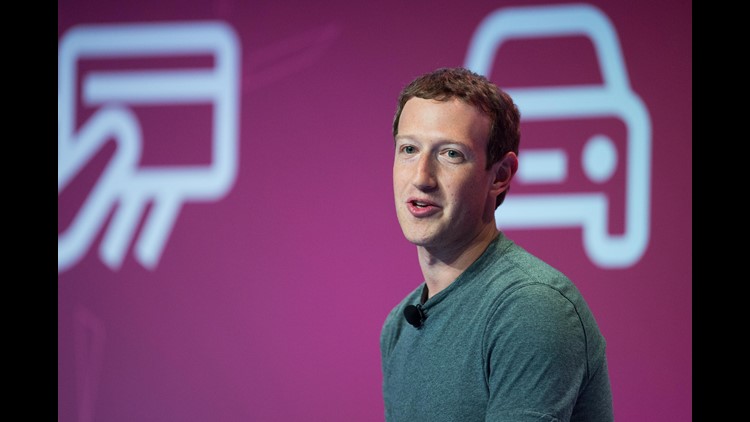(CNN) — There’s a side of official Washington that few Americans typically see, let alone experience. It exists, for the most part, beyond the reach of television cameras, away from congressional meeting rooms, often after normal business hours; a world of private cocktail receptions, salon dinners and one-on-one sessions with powerful people.
This is the world Mark Zuckerberg has been inhabiting for the past three days.
In a whirlwind tour of the nation’s capital this week, Facebook’s CEO has flitted from a swanky meal with US senators to an Oval Office session with President Donald Trump to a face-to-face with members of the House Judiciary Committee conducting an antitrust investigation of the tech industry. The rare visit by the billionaire entrepreneur highlights the gravity of the moment for Facebook as some of Zuckerberg’s sharpest critics have called for, among other things, a spinoff of WhatsApp and Instagram.
The question of the week is this: Did Zuckerberg’s charm offensive work?
It’s a question with as many answers as the number of people Zuckerberg met this week. The official purpose of his visit, as Facebook put it in a bland statement on Wednesday night, was to talk about the future of internet regulation. By that low bar, Zuckerberg certainly seems to have succeeded. (Facebook declined to comment.)
Meeting Democratic Sens. Mark Warner of Virginia and Richard Blumenthal of Connecticut at a West End bistro Wednesday night, Zuckerberg discussed his company’s role in securing America’s elections, and its effect on competition in the social media marketplace. He talked about privacy and consumer data with Washington Sen. Maria Cantwell, the top Democrat on the Senate Commerce Committee, who’s working on a federal privacy bill. And Democratic Rep. Adam Schiff of California, the chairman of the House Intelligence Committee, told reporters Friday the two men talked about the dangers of “deepfakes,” or computer-manipulated videos of real people saying fake things.
But, in a town that runs on public perception, the substance of the encounters is almost less meaningful than the fact they took place at all.
Zuckerberg’s pilgrimage reflects how much the executive’s approach to Washington has had to change from earlier days, when he could share a stage with President Barack Obama wearing nothing so formal as a T-shirt and jeans. Though this week’s fly-in was not Zuckerberg’s first — last year, he donned a suit and testified before Congress on the Cambridge Analytica scandal — the latest trip was no less of a Washington ritual. It conformed to the practice of countless executives who’ve gone before him, from countless businesses.
In return, some policymakers gave their version of glowing praise.
“I welcome the strong, constructive interest shown by Mr. Zuckerberg,” Blumenthal said this week. “We had serious, substantive conversation even when we may have differed, and I look forward to continue this conversation.”
Even Trump, who has often criticized Facebook in the past, offered a grudging assessment of their exchange.
“Nice meeting,” he tweeted.
For his part, Zuckerberg appeared to go into the meetings willing to listen, but did his best not to make concessions. He rebuffed a request by Missouri Republican Sen. Josh Hawley to sell off WhatsApp and Instagram, for example, as well as another request to prevent the sharing of data between Facebook and its subsidiaries.
“It was a lot of, ‘Well, we’ll see, we haven’t figured out what we’re going to do,'” Hawley said of Zuckerberg.
Hawley expressed frustration at how difficult it was to pin the CEO down. And it’s clear Hawley remains unpersuaded by Zuckerberg on a range of issues. But Zuckerberg did provide Hawley with a small victory, acknowledging there was “clearly bias” on the part of Facebook’s fact-checking partners in a controversy over a pair of videos by an anti-abortion group, according to Hawley.
Facebook does not dispute Hawley’s account. But like other social media companies, it has vehemently denied any implication that there’s a wider ideological bias baked into its technology. Researchers who’ve studied the issue have similarly failed to turn up any systemic evidence of a partisan bias among large tech platforms, though much of Silicon Valley’s workforce does lean liberal.
It’s hard to say whether Zuckerberg’s visit may lead to lighter consequences for the tech industry, if and when policymakers ultimately get around to taking action. Regulators at the Justice Department and the Federal Trade Commission are still going to go where their investigations lead, based on the facts and the law — a visit to Congress by Zuckerberg isn’t likely to change that.
Still, Congress does play an important role in applying pressure on regulatory agencies — a fact that’s often forgotten in the history of major antitrust cases, according to Gene Kimmelman, a former Justice Department antitrust official.
“At the time the government broke up AT&T, what many people don’t realize is that Congress was in the process of passing legislation that would have also restructured or broken up AT&T,” he said. “So there was enormous parallel tracking between the Justice Department case and the congressional effort to restructure the telephone monopoly.”
The-CNN-Wire



